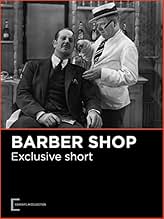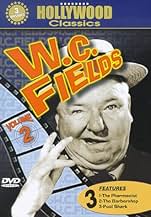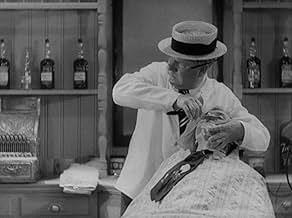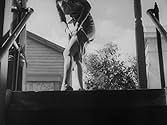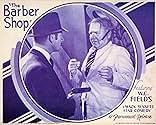An inept barber maintains his good-humored optimism in his small town shop despite having a hen-pecking harridan for a wife and a total lack of tonsorial skill.An inept barber maintains his good-humored optimism in his small town shop despite having a hen-pecking harridan for a wife and a total lack of tonsorial skill.An inept barber maintains his good-humored optimism in his small town shop despite having a hen-pecking harridan for a wife and a total lack of tonsorial skill.
John Sinclair
- Mr. Flugg
- (as John St. Clair)
Frank Alexander
- Steam Room Victim - Before
- (uncredited)
Billy Bletcher
- Steam Room Victim - After
- (uncredited)
Joe Bordeaux
- Passerby
- (uncredited)
Harry Bowen
- Cop
- (uncredited)
Joe Calder
- Passerby
- (uncredited)
Julia Griffith
- Mrs. Scroggins - Passerby
- (uncredited)
Fay Holderness
- Little Girl's Mother
- (uncredited)
George Humbert
- Jose
- (uncredited)
William McCall
- Man with Horse
- (uncredited)
Frank Yaconelli
- Italian Man Selling Bass Fiddle
- (uncredited)
- Director
- Writer
- All cast & crew
- Production, box office & more at IMDbPro
Featured reviews
This is one of the oddest films I've seen of W. C. Fields because he seems to genuinely like his son! The young boy loves to tell really lame riddles and W. C. encourages him and acts pretty tenderly towards the kid (at least compared to the usual fare from this comedian). Children are either just tolerated or hated in his films. A good example was his famous line "Of course I love kids,....boiled". For whatever reason, this film is unusual in this respect.
Now as for the film itself, this one is very similar to THE PHARMACIST in that it is a very slow slice of life short, though it does have more gags and a more "Fields-like" ending. Don't expect the craziness of Fields shorts like THE DENTIST or THE FATAL GLASS OF BEER, but this isn't a positive or negative thing--I like both styles of his work. Funny, well-paced and cute--this is an excellent Fields short.
Now as for the film itself, this one is very similar to THE PHARMACIST in that it is a very slow slice of life short, though it does have more gags and a more "Fields-like" ending. Don't expect the craziness of Fields shorts like THE DENTIST or THE FATAL GLASS OF BEER, but this isn't a positive or negative thing--I like both styles of his work. Funny, well-paced and cute--this is an excellent Fields short.
The Barbershop was the fourth and last Mack Sennett short subject that W.C. Fields did for Paramount. In this last one and in The Pharmacist he honed his henpecked character to perfection.
As you gather by the title Fields is a barber and he lives above the shop with his wife Elsie Cavanna and son Harry Watson who is busy annoying dad with a lot of stupid riddles. It may have been in this film and in The Pharmacist that Fields developed his well known appetite for children. Remember he said he liked them if they were properly cooked.
His moment of sunshine every day is shapely manicurist Dagmar Oakland who brightens his working day. But Fields is so under the thumb of his wife he dare not make a move. Still he can and does dream.
My favorite gag is the very obese gentleman who went into the steam room Fields installed and came out like a third world starvation victim. If losing weight were only that simple.
I do also like that two bull fiddles mate and have a nice litter of violins as a result. That's another great sight gag.
In the end Fields does not get credit for an albeit accidental act of heroism. But it's all in a day for Fields whose characters just can't catch a break ever.
As you gather by the title Fields is a barber and he lives above the shop with his wife Elsie Cavanna and son Harry Watson who is busy annoying dad with a lot of stupid riddles. It may have been in this film and in The Pharmacist that Fields developed his well known appetite for children. Remember he said he liked them if they were properly cooked.
His moment of sunshine every day is shapely manicurist Dagmar Oakland who brightens his working day. But Fields is so under the thumb of his wife he dare not make a move. Still he can and does dream.
My favorite gag is the very obese gentleman who went into the steam room Fields installed and came out like a third world starvation victim. If losing weight were only that simple.
I do also like that two bull fiddles mate and have a nice litter of violins as a result. That's another great sight gag.
In the end Fields does not get credit for an albeit accidental act of heroism. But it's all in a day for Fields whose characters just can't catch a break ever.
With the great W.C. Fields in fine form, and a setup that provides him with a lot of good material, "The Barber Shop" is a very enjoyable short comedy. It is filled with the kinds of details and subtle gags that make Fields's comedies worth watching attentively.
"The Barber Shop" closely resembles the Fields feature "The Pharmacist", with very similar settings and stories. Both are very good, and in both of them Elise Cavanna is funny as the domineering wife of Fields's character. Both have some gags that are deliberately absurd, and others that are less obvious. Both feature amusing exchanges between Fields and numerous customers.
When Fields was at his best, he could really get across the wackiness of so much of what happens in daily life, and that's one of the things that works quite well here.
"The Barber Shop" closely resembles the Fields feature "The Pharmacist", with very similar settings and stories. Both are very good, and in both of them Elise Cavanna is funny as the domineering wife of Fields's character. Both have some gags that are deliberately absurd, and others that are less obvious. Both feature amusing exchanges between Fields and numerous customers.
When Fields was at his best, he could really get across the wackiness of so much of what happens in daily life, and that's one of the things that works quite well here.
Although he usually gets high marks for being funny, W.C. Fields seldom gets credit for versatility. Even people familiar with his work tend to define his screen persona narrowly as a cantankerous, lecherous old blow-hard who hates kids and dogs, and is usually drunk. This image was firmly ingrained in the public imagination during the late 1930's and '40s through his radio work and most of his later movie appearances, but a look back at the films he made in the early to mid-'30s reveals distinct variations in his roles. He was capable of a surprising range of nuance, and was not at all a Johnny One Note who could only play "W.C. Fields" over and over.
As evidence of this, consider the four short films Fields made for producer Mack Sennett during the 1932-33 season. Three of the four bear certain similarities, each presenting our hero in the role of middle-class professional man: dentist, pharmacist, and barber. Each character lives over his place of business, and each has difficulties with his family and his customers, but beyond the superficial similarities there are decided shades of difference in Fields's portrayals. In The Dentist he is ornery, mean to his daughter, and openly contemptuous towards his patients. In The Pharmacist he's once more a petty tyrant when dealing with his family, but on the job he's ridiculously agreeable and positively masochistic in his desire to please his customers. In The Barber Shop, his last Sennett comedy, Fields is downright mellow, and the atmosphere is more laid-back and whimsical than in the other films.
Fields plays Cornelius O'Hare, barber of Felton City. ("Felton" was the maiden name of Fields' mother, and it's said that his mumbling delivery of wisecracks, as demonstrated in the opening scene, owed a lot to his mother's personal style.) O'Hare likes to hang out in front of his shop and shoot the breeze. His business is struggling and his wife is a nag, but his life has its compensations: he has a friendly relationship with his son, who likes to tell riddles, and gets to flirt with an attractive young manicurist named Hortense who works in his shop and seems to like him. During the course of the film we follow O'Hare through his dealings with difficult customers and various passersby. We learn that O'Hare is not a very good barber -- to put it politely -- but he seems to be a decent enough guy. And when his day ends in a humiliating encounter with a bank robber, we feel a little sorry for him.
The Barber Shop may not be the funniest short Fields ever made, but there are laughs throughout, and you'll seldom find him as sympathetic as he is here. I especially enjoy the surreal touches, such as the steam room that reduces an obese man to a skinny one in a matter of minutes, and the climactic gag involving O'Hare's bass fiddle. These wacky gags, in combination with Fields' more benign persona, make this one of The Great Man's most pleasant comedies, one that might win over non-fans who are put off by his nastier characterizations in other movies.
Released during the Depression summer of 1933, The Barber Shop holds a melancholy place in Hollywood history: according to Simon Louvish's biography of Mack Sennett, this was the last film put out by Sennett's studio before it went into bankruptcy and was forcibly closed. Sennett had been in business as a producer since he founded Keystone in 1912, and although he managed to limp along with minor projects for another year or two this pretty much marked the end of the line for him. Sad, but at least Mack was able to finish his career on a high note, thanks to Mr. Fields.
As evidence of this, consider the four short films Fields made for producer Mack Sennett during the 1932-33 season. Three of the four bear certain similarities, each presenting our hero in the role of middle-class professional man: dentist, pharmacist, and barber. Each character lives over his place of business, and each has difficulties with his family and his customers, but beyond the superficial similarities there are decided shades of difference in Fields's portrayals. In The Dentist he is ornery, mean to his daughter, and openly contemptuous towards his patients. In The Pharmacist he's once more a petty tyrant when dealing with his family, but on the job he's ridiculously agreeable and positively masochistic in his desire to please his customers. In The Barber Shop, his last Sennett comedy, Fields is downright mellow, and the atmosphere is more laid-back and whimsical than in the other films.
Fields plays Cornelius O'Hare, barber of Felton City. ("Felton" was the maiden name of Fields' mother, and it's said that his mumbling delivery of wisecracks, as demonstrated in the opening scene, owed a lot to his mother's personal style.) O'Hare likes to hang out in front of his shop and shoot the breeze. His business is struggling and his wife is a nag, but his life has its compensations: he has a friendly relationship with his son, who likes to tell riddles, and gets to flirt with an attractive young manicurist named Hortense who works in his shop and seems to like him. During the course of the film we follow O'Hare through his dealings with difficult customers and various passersby. We learn that O'Hare is not a very good barber -- to put it politely -- but he seems to be a decent enough guy. And when his day ends in a humiliating encounter with a bank robber, we feel a little sorry for him.
The Barber Shop may not be the funniest short Fields ever made, but there are laughs throughout, and you'll seldom find him as sympathetic as he is here. I especially enjoy the surreal touches, such as the steam room that reduces an obese man to a skinny one in a matter of minutes, and the climactic gag involving O'Hare's bass fiddle. These wacky gags, in combination with Fields' more benign persona, make this one of The Great Man's most pleasant comedies, one that might win over non-fans who are put off by his nastier characterizations in other movies.
Released during the Depression summer of 1933, The Barber Shop holds a melancholy place in Hollywood history: according to Simon Louvish's biography of Mack Sennett, this was the last film put out by Sennett's studio before it went into bankruptcy and was forcibly closed. Sennett had been in business as a producer since he founded Keystone in 1912, and although he managed to limp along with minor projects for another year or two this pretty much marked the end of the line for him. Sad, but at least Mack was able to finish his career on a high note, thanks to Mr. Fields.
Another dose of madness from W. C. Fields, this short sees him playing the part of Cornelius O'Hare, small-town barber with a cutting observation for all who pass his path. Fields comes up with a number of gags that possibly only he would dream up, whether its testing the sharpness of a razor on his tongue, playing a bass fiddle in his own inimitable way, or shaving a hapless customer with all the delicacy of a blind man painting a barn door. This forms a loose trio with The Dentist and The Pharmacist, which Fields also made for Mack Sennett, and all of which present the comedian at the height of his talent although this one is perhaps the weaker of the three.
Did you know
- TriviaThis film is included on "W.C. Fields - Six Short Films", which is part of the Criterion Collection, spine #79.
- Quotes
Cornelius O'Hare: I'm the worst barber in town, my wife can tell you that.
- ConnectionsEdited into W.C. Fields: 6 Short Films (2000)
Details
- Runtime
- 21m
- Color
- Sound mix
- Aspect ratio
- 1.37 : 1
Contribute to this page
Suggest an edit or add missing content

